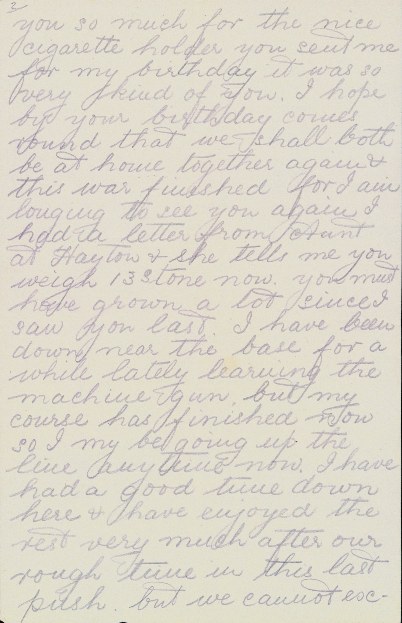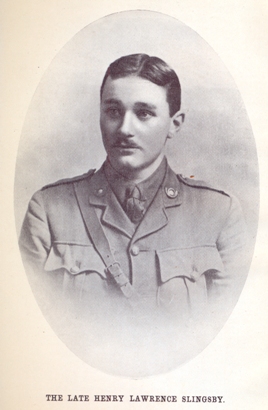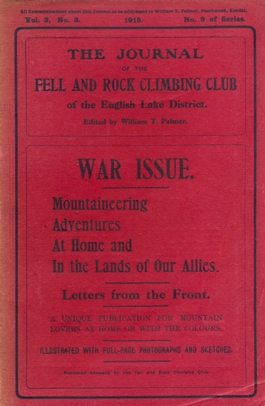Cumberland Council has now replaced the previous Cumbria County Council and 3 District Councils. The content on this website is still relevant including documents that may include the old county council logo. Find out about the council changes
Please update any cumbria.gov.uk browser shortcuts you may have to the new site pages as needed
Letters Home



Early Letters from the Front
by Denis Perriam
At the beginning of World War One there was great patriotic feeling and recruits came forward in ever increasing numbers to join the colours. Newly-trained local recruits and regulars were facing the Germans in France and Belgium by October when the carnage began.
Government censorship was such, in those early days, that there were press complaints that people did not know what was going on. Newspapers resorted to publishing letters from soldiers at the Front, to show what was really happening, and the Carlisle Journal was no exception.
Private MacDonald, a carter with Messrs. Foster Bros in Carlisle before the war, was serving in the 16th Lancers in October 1914. He wrote: "You will wonder at me not putting the place where we are, but we are not allowed to do so; if we do there is a chance of the letter not going…the letters have to be left open to be read." As a result, he was cautious: "We have had good times and hard times but I don't think it can last much longer: at least I hope not."
In these early days, soldiers considered the war a great adventure. Captain Dawson-Scott wrote to his father in Penrith on 21st September: "I am wonderfully fit and would not for worlds be away from here." Both he and his brother were dead by March 1915.
Private W Wightman, of London Road, Carlisle, serving in the 2nd Borders, wrote on 22nd October 1915: "We have been out here for a day or two…the send-off we got was champion and the reception was in fact better." He had landed in Belgium and "the population was after souvenirs, so we lost our Borders [badges] in no time…I would not mind soldiering a lifetime if it was always like this."
The Carlisle Journal ran a feature in November on "5th Borders life on the Continent" in which it stated "the different opinions expressed as to the probable length of the war are interesting; some say six years won't see it finished and others argue that we'll be home for Christmas."
By November, the 2nd Borders were dug in and Private RJ Sewell, from Kells Place, Stanwix, Carlisle wrote: "Ever since we came out here I have been in the firing line…as long as I live I shall never forget the terrible experiences I have had." He was lucky: "I was hit four times in one day, but it didn't draw blood and am still alive." But the Carlisle Journal, in February 1915, reported he died from wounds received in action at Lys and a memorial service was held at St. Michael's Church, Stanwix for him.
Corporal Leighton, of Garfield Street, Carlisle, serving in the Coldstream Guards, wrote from hospital in Dublin, after being wounded in the leg at Ypres in November: "Somebody has to be hit and I am one of the unfortunate ones. You ask me what a bayonet charge is like; you would just think our men were made of steel as well as the bayonets, for there is no chance of stopping them when once they charge…some singing and others passing jokes."
A soldier wrote to say that he was in four bayonet charges in one day.
Most soldiers had a very poor opinion of the enemy. Private R Sowerby, of the Coldstream Guards, wrote to his mother in Beta Court, William Street, Carlisle; "We made a charge with our bayonets to clear the trenches and the German losses were very heavy." He considered "the Germans a very poor fighting class." Some felt sorry for the Germans, Private Alfred Blythe, of The Border Regiment, writing to his wife at Holme Terrace, Milbourne Street; "We gave them "socks" and there were many thousands of the poor devils lying dead in heaps…it is pure slaughter." He was wounded and was sent home to recuperate but when asked how he received his wound he said that he preferred not to talk about it. He had been trying hard to forget it but it would not leave his mind and he had scarcely slept for a fortnight.
Lance Corporal HR Gibson, of the 2nd Borders, had watched the Germans retreating and they were ready to run after them when orders came to hold fast. He wrote: "While waiting, a shell burst behind me, killing one officer and 10 men and wounding five. After being hit I remembered no more…it's not war but murder."
Various nicknames were used and Private J Bell, of the 2nd Borders, wrote "those big guns we call coal bags - they are dirty lads when they burst."
Many soldiers experienced trench warfare. Private Sam Wiseman, of Potter's Court, Shaddongate, Carlisle, wrote in November; "We have been in the trenches for eight days, the most terrible days of my life."
"We have been shelled on six days with shrapnel and cannon shell…what sights we have seen - men with arms and legs off; it was enough to turn anyone mad." He had just laid his pack "on the back of the trench for a minute and down came a shell and away went my pack with my shirt, razor and socks so I was left with nothing. My hat went also, so I was nicely done."
This was before men were issued with tin helmets, the Journal reporting in November 1915 that "a certain number of British troops have been equipped with light steel helmets…should the innovation prove successful, the issue will be largely increased."
Duncan McLaren, of Carlisle, was in Flanders with the Gordon Highlanders but wrote on 14 November 1915 from hospital in Manchester; "After advancing through a wood they let us have it and I received what I thought was a kick in the chest from a 100hp hob-nailed boot." He wrote: "The two holes in my chest are filling up grand and my left arm is just about all right…the bullet went clean through the fleshy part." He reckoned that out of his battalion of 1,100 men only 400 were unscathed.
When censorship was relaxed, Gunner C Richardson, of Woodbank, Carlisle, wrote on 21 October "We are allowed to put a bit more news in our letters now so I can tell you I was at Mons, Cambrai, Landrecies and the battle of the Aisne….I managed to get a bath and it is quite an experience to have a wash out here….we have had three of the hottest days since we came out here and the battery lost one man and about 10 wounded."
He was "sitting in a trench now, with shells and rifle bullets flying around…send me some chocolate - a good solid lump."
Three columns were given to his experiences in the 9th Battery RFA, in March 1915, he having been "out since the beginning."
Colour Sergeant M Jones, of the 2nd Borders, wrote: "It is very hard to get a letter home as we are not always able to obtain writing material or to get them posted…our regiment has just come out of the trenches where we have been over a week. I have lived a lifetime in that one week, my head aches something terrible with the thud of the shells on our trenches and we were shelled out every day."
'Somewhere in France'
The 1915 Journal of the Fell and Rock Climbing Club of the English Lake District was entitled 'War Issue.; Mountaineering Adventures At Home and in the Lands of Our Allies; Letters from the Front'.
One of these letters from the front was from Lieut. H. Lawrence Sligsby a regular with the King's Own Yorkshire Light Infantry. He wrote home about the British Expeditionary Forces retreat from Mons on 24th August 1914 recalling that 'The retreat had lasted in all about fourteen days, during which time we were continuously marching or fighting. In that fourteen days we marched from Mons to Coulommiers, a distance of 130 miles as the crow flies.' He continued the account in his letter;
'On the night of the 6th Sept. we were told that on the morrow we were going to turn around and give battle to the Germans. Generally speaking, just before going into action one is in a horrible funk; I certainly am. But on this occasion we were so thankful that the retreat was ended that we didn't mind what happened so long as we got our own back on the Germans. The Battle of the Marne lasted about three days and I must admit that I have seldom enjoyed myself more, as the change was so great after all the marching we had been through. Walking up Rosset Ghyll with a heavy rucksack on your back on a boiling hot day, with the streams all dry, is bad enough, but marching on cobbled roads with Germans hard after you is the limit. It was a wonderful experience for a young soldier. The hasty marches up to the frontier, the thunder of guns, distant at first then coming closer, outflanking one's position and even threatening the rear. One is proud to remember that the slender British column of which we were a part was the cause of German disaster.'
The 1917-18 issue of Fell and Rock Journal was to carry his obituary. It recorded that he was severely wounded in the head in February 1915 near Ypres not returning to the front until June 1916. He was awarded the Military Cross for 'general good service in the field'. On Saturday 11 August 1917 a shell hit his headquarters mess , killing the Colonel and Major outright and shattering Slingsby's thigh. ' By nightfall he had breathed his last'.
Photos and extracts reproduced courtesy of the Fell and Rock Climbing Club of the English Lake District.

